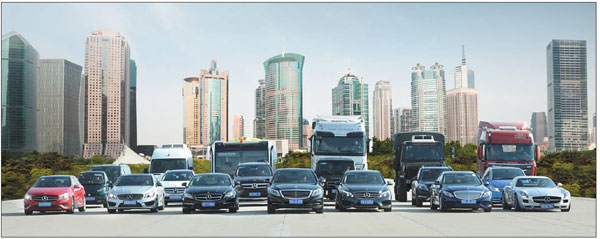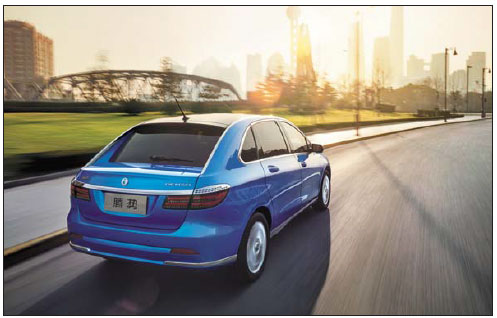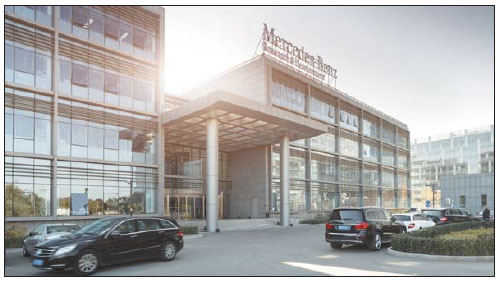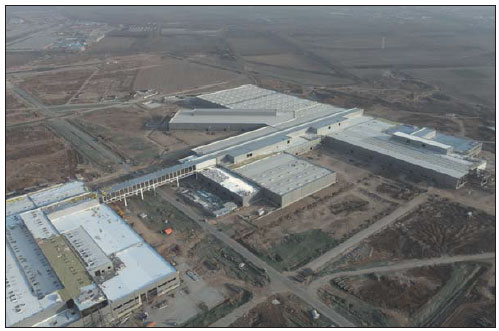Sustainable growth, in and with China
Daimler's successful forward-looking strategy is supported by its complete strong product lineup, continuously growing local footprint and strong partnerships
2014 was a very good year for Daimler AG on a global level. The German carmaker continued its successful development and once again set new records for unit sales and revenue from its ongoing business.
With more than 2.5 million vehicles sold, the unit sales were 8 percent higher than in the previous year, mainly driven by the company's passenger car and vans business. With its divisions Mercedes-Benz Cars, Daimler Trucks, Mercedes-Benz Vans, Daimler Buses and Daimler Financial Services, Daimler posted a 10-percent revenue increase last year over the year before. All this immediately makes clear: Daimler is on a successful path.
"Our growth strategy is obviously bearing fruit, and all of us at Daimler are very proud of it. Nonetheless, we still are not satisfied with what we have achieved," said Dieter Zetsche, chairman of the Board of Management of Daimler AG and head of Mercedes-Benz Cars. In order to achieve its goals on a sustained basis, Daimler is reorganizing in several areas.
"We are forging ahead with the renewal of our company. We are going new ways to new strengths," said Zetsche. "Our new products provide the first visible proof of this."
Contributing to Daimler's upward curve trend is its key market China, where the company is step by step picking up the pace, backed up by a full range of products and services.
"Having the right products, a strong local production footprint and strategic partnerships are essential for our sustainable growth in China," said Hubertus Troska, member of the Board of Management of Daimler AG, responsible for Greater China. "In 2014, we again strengthened our presence in the world's biggest automotive market. This is in particular true for our Mercedes-Benz passenger cars business that grew 28 percent year-on-year. And, I have no doubts, we will continue to grow with above-market double-digit growth this year, which will result in significantly more than 300,000 units in China by the end of 2015."
Mercedes-Benz
The first three months of 2015 saw a very strong performance for Mercedes-Benz in markets around the world. In China, the Beijing Mercedes-Benz Sales Service Co Ltd continued to build on its sales momentum with strong first quarter sales growth of 18 percent. Powered by a lasting, strong product offensive, the company is set to keep the momentum throughout the full year.
Helping support this sales growth in China has been, and will also be in future, the expansion of financial services offered by Mercedes-Benz Auto Finance China Ltd and Mercedes-Benz Leasing Co Ltd. The latter, established in 2012, became the first premium automotive financial services brand to provide its own leasing solutions to both commercial and private customers across China.
It was also the first captive auto finance company in the country to launch a leasing product with guaranteed future value. Agility, as it is named, won the 2014 China Best Auto Finance Product Award.
In January 2015, the company began offering operating leases in six pilot cities, offering more value and flexibility for the customers. Only a couple of weeks later Daimler and BAIC Motor signed a new agreement that will extend the two companies cooperation in China to the area of automotive-related financial services, which will allow even more Chinese consumers to fulfill their Mercedes-Benz dreams.
In 2014, Mercedes-Benz Auto Finance China financed or leased almost 60 percent more vehicles in China than it did in the previous year. About one in four Mercedes-Benz vehicles has hit Chinese roads through financial and leasing services. With the company's expanding finance and leasing programs, there will be more growth opportunities for the brand.
Local production
Besides financial services, local production is at the core of the Mercedes-Benz success story in China, and a key to the company's sustainable growth.
Daimler's local production joint venture Beijing Benz Automotive Co Ltd, or BBAC, has been essential to this strategy. In line with its "Made in China, for China" promise, new additions to the locally produced portfolio of Mercedes-Benz vehicles are yet another important way the company is carrying through with its China commitment.
Just a few days ago, the locally produced all-new, premium compact SUV GLA began rolling off the production lines at BBAC, after the completion of a 720 million euros ($778 million) investment in a top-notch compact car plant.
Built from scratch in a record time of less than three years and stretching across about 1.5 million square meters - at present - the Beijing-based compact car factory is another key milestone for Mercedes-Benz, as it is the largest Mercedes-Benz passenger car plant worldwide. It goes without saying that it will also significantly drive BBAC's local production capacity, which is expected to reach in total about 250,000 passenger cars by the end of the year.
A 250,000-unit capacity for locally manufactured 4- and 6-cylinder engines is on top to that. BBAC now houses not only the largest production facility for the "cars with the star", but also the only one in the world that combines production lines for front-wheel and rear-wheel-drive cars, along with engines in one location. Yet, this is certainly not the last time that BBAC will write history for Mercedes-Benz both in and with China.
BBAC's tremendous growth of course also includes its number of employees. Staffing at BBAC has grown to over 10,000, a fourfold increase over the last decade. Just for the ramp-up phase of the new compact car plant, 800 employees were solely dedicated to the new plant. Many of these employees have been trained abroad, primarily at Mercedes-Benz's compact car plant in Rastatt, Germany.
Back in Beijing, these employees acted as training multipliers, directly passing on their knowledge to hundreds of colleagues. This all proves that BBAC's expansion does not come at the expense of quality.
Like all other Mercedes-Benz plants worldwide, BBAC's local production is held to the German carmaker's strict global production and management standards. The exporting of key machined engine components from BBAC to Germany that started last summer shows how efficient the quality control is in the Beijing plant.
R&D efforts
In fact, Daimler's localization efforts not only stretch to production, but also to the strengthening of its research and development activities in China. In November Daimler opened its new Mercedes-Benz R&D center in Beijing, which also includes a state-of-the art Advanced Design Studio that covers the widest field of action amongst all of Mercedes-Benz's passenger car design studios outside Germany. The company is confident that this move will give Chinese customers' voices even more weight in their global network and future product development. By the end of this year more than 500 highly qualified engineers and designers will be working at Mercedes-Benz's new R&D site in Beijing.
China electric car
Daimler's R&D presence is also strong outside Beijing. In Shenzhen, Daimler teamed up with BYD in 2010 to establish the Shenzhen BYD Daimler New Technology Co Ltd, the first all-electric vehicle joint venture in China, and develop the all-electric vehicle , DENZA. The car combines Daimler's renowned automotive expertise and excellence with BYD's advanced battery technology.
The two company's efforts remain unmatched so far, like the DENZA itself, which is the safest, most reliable and most convenient Chinese electric vehicle from and for China.
Since its world premiere during last year's Auto China, Chinese customers have enthusiastically welcomed the DENZA's launch that started in September 2014 in a series of local markets in Shanghai, Beijing, and Shenzhen. In fact, DENZA seems not only to be appealing to private customers, but also fleet customers in China.
In January, domestic ride-hailing company Yidao Yongche placed an order for the first batch of DENZA vehicles for its fleet. Their users' response to DENZA's electric driving experience was so positive the company placed its second order just days later.
This year, DENZA will continue its network expansion initiative, with sales operations starting in Hangzhou and Nanjing in April. Additional cities such as Tianjin, Xi'an, Wuhan and Guangzhou will follow by the end of the year.
Further ahead, the company is preparing an even more ambitious network expansion for 2016, aiming to lead the growth of China's new-energy vehicle market.
Innovative new products like DENZA are just one example of Daimler's forward thinking strategy in China. Supported by an overall strong product portfolio, the company's continuously growing local footprint and strong partnerships, Daimler is firmly taking root in China. "We will continue both our investments and commitment in China, and so continue to lay the foundation for our strong and sustainable growth here," said Troska.
|
Daimler Greater China's Chinese product portfolio Photos Provided to China Daily |

|
DENZA, the all-electric vehicle developed by Daimler and BYD |
|
Daimler opened its new Mercedes-Benz Research and Development Center in Beijing in November. |
|
The Beijing-based compact car plant for Daimler's local production joint venture Beijing Benz Automotive Co Ltd has just started operation. |
(China Daily 04/20/2015 page28)


















